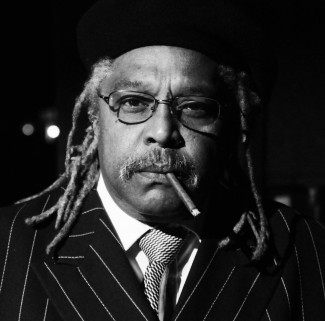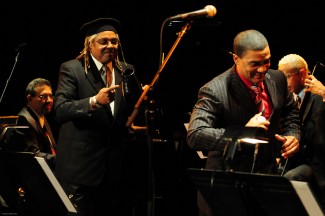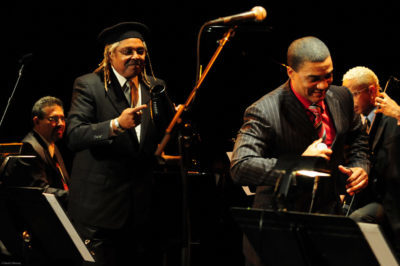INTERVIEW: Juan de Marcos González brings Cuban music to the world

When Juan de Marcos González, band leader of the Afro-Cuban All Stars, took the stage at the Tarrytown Music Hall for a recent concert, he had an air of authority about him. He conducted his impressive grouping of musicians — including his wife and two daughters — with an effortless zeal, allowing them freedom and offering them direction. By the end of the two-hour performance, he had welcomed the audience on the stage and bounced up and down to the Cuban beats of his musical colleagues. He was fully immersed in the moment.
González, a main influence behind the successful Buena Vista Social Club sessions, loves the thrill of live music. “During the concert, I really enjoy it,” he said recently on a phone interview. “I enjoy the way that the people respond to the music.”
The jumping around with the audience is not simply a means to have fun. González sees it as a cultural exchange and an opportunity to introduce even more people to his brand of Cuban music. His message: “[T]his is Cuban music, and we are here.”
At the Tarrytown Music Hall in quaint Tarrytown, N.Y., there wasn’t a touch of politics in the air. Even though the tenuous relationship between the United States and Cuba might overshadow governmental affairs, among the packed crowd, it was all about the rhythm of the night. “You know for many years our music disappeared off the market because of political reasons,” he said. “So right now we have the chance to tell the people that we are really here, and this is our music, and it is a piece of our small island in the Caribbean.”
The band is finishing up its final concerts in the United States before heading to Europe for more than a dozen gigs. No matter the culture, the music permeates. “It’s a matter of the music, the kind of music and how the music can connect with the people,” he said. “This kind of music is very, I don’t know, attractive — perhaps because the accent of the music is in the fourth beat of the bar, which means that this is the way that the women walk, you know. The accent is on the fourth beat of the bar, while in the western music, the accent is either on the first or the third beat of the bar.”
González said he often changes the lineup of the Afro-Cuban All Stars depending on the project. If he wants to record a jazz album that’s a little more “intellectual” in nature, he’ll choose one set of musicians. If he wants to record a “more danceable” album of Cuban music, he’ll choose another grouping.
“And one more thing that I do, sometimes I bring people of the old generation,” he said. “You remember the first lineup of the African Cuban All Stars was composed by really old guys, and the second and third lineup as well. Yeah. In the second and third lineup, we started mixing people of the old generation and the young generation, which makes a really good combination. So we never have the same band. Perhaps the next time we come to America, it’s going to be another band. But the music was the same thing. It’s the same Cuban music.”

The Cuban musician has had a long history in the business, learning from his father, playing with Sierra Maestra and jumpstarting the Buena Vista Social Club project. He’s a man with a clear identity with his island home, but one who relishes the international life. He owns a house in Havana, plus has properties in London and Mexico. Because his daughters have been attending college in Mexico, he has lived away from Cuba for several years. This global feel is also true of the current lineup of the All Stars.
“For the rest of the guys, some of them are based in Europe, some of them in Mexico, and about six of the current band living in Cuba. So we live in different parts of the world, and this is great. This is good. Because at the same time we are sending the message that there’s only one Cuba, only one identity, only one culture.”
As he nears 60 years old, González finds the open road a little more daunting than he did as a younger man. The current U.S. tour takes the All Stars around the country, playing 40 concerts. González and his wife of 36 years organizes and takes care of most of the band’s responsibilities. “Of course, it’s tough, but at the same time you have the satisfaction that the people are enjoying what you’re doing, and that the people are getting a small piece of our country and our culture,” he said.
What makes it easier for the musician is having his family so close by. At that Tarrytown Music Hall concert, both of his daughters offered their music to the adoring crowd. One plays clarinet in the background, while the other plays keyboards. “They are great musicians, and they are learning with older people how to perform the Cuban music,” he said. “And this is special because you have your blood in the band, and you see how they are developing day by day. … Sometimes, you know, they are really tough. They are three ladies, and I’m the only one. I’m the band leader, but I’m the father as well, so you know women they need special treatment.”
The musical journey is somewhat surprising for González, if for no other reason than his father wanted him to take a different path in life. “My father used to be a singer for one of the Cuban top bands of the ’30s and ’40s, and he never wanted me to be a musician,” González said. “For him, to be a musician wasn’t to have a proper career. He wanted me to be an engineer, a doctor or a lawyer. So I went to the university as well, and I started engineering. I got a PhD later. I was teaching at the university, but always music was my life. About 20 years ago, I decided to become a full-time musician.”
Two decades later, González is able to make good on his life’s ambitions: “I’m happy,” he said. “Music is my life.”
By John Soltes / Publisher / John@HollywoodSoapbox.com
-
Click here for more information.

